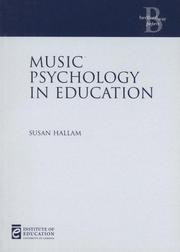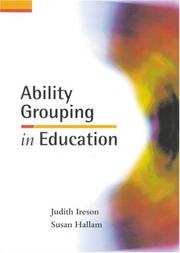| Listing 1 - 8 of 8 |
Sort by
|

ISBN: 9780854737161 0854737162 Year: 2008 Publisher: London University of London. Institute of education
Abstract | Keywords | Export | Availability | Bookmark
 Loading...
Loading...Choose an application
- Reference Manager
- EndNote
- RefWorks (Direct export to RefWorks)
Book
ISBN: 1800644183 Year: 2022 Publisher: Cambridge, UK : Open Book Publishers,
Abstract | Keywords | Export | Availability | Bookmark
 Loading...
Loading...Choose an application
- Reference Manager
- EndNote
- RefWorks (Direct export to RefWorks)

ISBN: 0761972080 9786611362058 1281362050 1847876919 9780761972082 9781281362056 9781847876911 Year: 2001 Publisher: London : Thousand Oaks, CA : Paul Chapman ; Sage,
Abstract | Keywords | Export | Availability | Bookmark
 Loading...
Loading...Choose an application
- Reference Manager
- EndNote
- RefWorks (Direct export to RefWorks)
Drawing on their own and others' research in primary and secondary schools, the authors provide an accessible analysis of the issues and latest research on ability grouping.
Ability grouping in education. --- Ability grouping in education --- Evaluation. --- Educational psychology
Book
Year: 2022 Publisher: Cambridge : Open Book Publishers,
Abstract | Keywords | Export | Availability | Bookmark
 Loading...
Loading...Choose an application
- Reference Manager
- EndNote
- RefWorks (Direct export to RefWorks)
"Building on her earlier work, 'The Power of Music: A Research Synthesis of the Impact of Actively Making Music on the Intellectual, Social and Personal Development of Children and Young People', this volume by Susan Hallam and Evangelos Himonides is an important new resource in the field of music education, practice, and psychology. A well-signposted text with helpful subheadings, 'The Power of Music: An Exploration of the Evidence' gathers and synthesises research in neuroscience, psychology, and education to develop our understanding of the effects of listening to and actively making music. Its chapters address music's relationship with literacy and numeracy, transferable skills, its impact on social cohesion and personal wellbeing, as well as the roles that music plays in our everyday lives. Considering evidence from large population samples to individual case studies and across age groups, the authors also pose important methodological questions to the research community. 'The Power of Music' defends qualitative research against a requirement for randomised control trials that can obscure the diverse and often fraught contexts in which people of all ages and backgrounds are exposed to, and engage with, music. This magnificent and comprehensive volume allows the evidence about the power of music to speak for itself, thus providing an essential directory for those researching music education and its social, personal, and cognitive impact across human ages and experiences."--Publisher's website.
Book
Year: 2022 Publisher: Cambridge, UK : OpenBook Publishers,
Abstract | Keywords | Export | Availability | Bookmark
 Loading...
Loading...Choose an application
- Reference Manager
- EndNote
- RefWorks (Direct export to RefWorks)
"Building on her earlier work, 'The Power of Music: A Research Synthesis of the Impact of Actively Making Music on the Intellectual, Social and Personal Development of Children and Young People', this volume by Susan Hallam and Evangelos Himonides is an important new resource in the field of music education, practice, and psychology. A well-signposted text with helpful subheadings, 'The Power of Music: An Exploration of the Evidence' gathers and synthesises research in neuroscience, psychology, and education to develop our understanding of the effects of listening to and actively making music. Its chapters address music's relationship with literacy and numeracy, transferable skills, its impact on social cohesion and personal wellbeing, as well as the roles that music plays in our everyday lives. Considering evidence from large population samples to individual case studies and across age groups, the authors also pose important methodological questions to the research community. 'The Power of Music' defends qualitative research against a requirement for randomised control trials that can obscure the diverse and often fraught contexts in which people of all ages and backgrounds are exposed to, and engage with, music. This magnificent and comprehensive volume allows the evidence about the power of music to speak for itself, thus providing an essential directory for those researching music education and its social, personal, and cognitive impact across human ages and experiences."
Book
ISBN: 9780199298457 9780199604975 Year: 2009 Publisher: Oxford Oxford University Press
Abstract | Keywords | Export | Availability | Bookmark
 Loading...
Loading...Choose an application
- Reference Manager
- EndNote
- RefWorks (Direct export to RefWorks)
009
Music therapy. --- Music --- Psychological aspects. --- Aesthetics --- Musique --- Musicothérapie --- Aspect psychologique --- Muziektherapie --- Music therapy --- 571 --- Music psychology --- Musical therapy --- Musicotherapy --- Therapeutics --- Psychotherapy and music --- Psychological aspects --- Muziekpsychologie --- Psychology --- Therapeutic use --- Musicothérapie --- Musicothérapie. --- Aspect psychologique.
Book
ISBN: 3030482626 3030482618 Year: 2020 Publisher: Cham : Springer International Publishing : Imprint: Palgrave Macmillan,
Abstract | Keywords | Export | Availability | Bookmark
 Loading...
Loading...Choose an application
- Reference Manager
- EndNote
- RefWorks (Direct export to RefWorks)
Susan Hallam is Professor Emerita at the UCL Institute of Education, UK. Her research interests in music include practising, performing, musical ability, musical understanding and the wider impact of engagement with music. Andrea Creech is Professor of Didactique Instrumentale at the Faculty of Music, Université Laval, Canada, where she holds a Canada Research Chair in music in community. Her current research and teaching focuses on collaborative learning, music for social development, and creative ageing in and through music. Maria Varvarigou is Lecturer in Music at Mary Immaculate College, Ireland. Her research interests focus on playing by ear and informal learning, intergenerational music making and choral conducting education. This book sets out a contemporary perspective on music education, highlighting complex intersections between informal, non-formal and formal practices and contexts. At a time when the boundaries between music learning and participation are increasingly blurred, this volume is distinctive in challenging a ‘siloed’ approach to understanding the diverse international music education landscape. Instead, the book proposes a multi-layered continuum of practices that can be applied across a range of formal, informal or non-formal concepts to support the development of musical possible selves. It challenges existing conceptions of learning in music education in part by drawing on research in adult learning, but also by considering the contexts in which learning takes place, and the extent to which this learning can be classified as formal, informal or non-formal. .
Music --- Instruction and study. --- Education, Musical --- Music education --- Musical education --- Musical instruction --- Study and teaching --- Art education. --- Learning. --- Instruction. --- Child development. --- Lifelong learning. --- Adult education. --- Creativity and Arts Education. --- Learning & Instruction. --- Early Childhood Education. --- Lifelong Learning/Adult Education. --- Adults, Education of --- Education of adults --- Education --- Continuing education --- Open learning --- Lifelong education --- Lifelong learning --- Permanent education --- Recurrent education --- Adult education --- Child study --- Children --- Development, Child --- Developmental biology --- Learning process --- Comprehension --- Art --- Art education --- Education, Art --- Art schools --- Development --- Analysis, interpretation, appreciation
Book
ISBN: 9780191799617 9780191034459 0191034452 Year: 2016 Publisher: Oxford Oxford University Press
Abstract | Keywords | Export | Availability | Bookmark
 Loading...
Loading...Choose an application
- Reference Manager
- EndNote
- RefWorks (Direct export to RefWorks)
The second edition of the Oxford handbook of music psychology updates the original landmark text which provided a comprehensive review of the latest developments in this fast growing area of research. The second edition has 55 chapters (three more than the original edition) divided into 11 parts covering both experimental and theoretical perspectives each edited by an internationally recognized authority in the area. The first ten parts present chapters that focus on specific areas of music psychology: the origins and functions of music; music perception, responses to music; music and the brain; musical development; learning musical skills; musical performance; composition and improvisation; the role of music in everyday life; and music therapy. In each part authors critically review the literature, highlight current issues and explore possibilities for the future. The final part examines how, in recent years, the study of music psychology has broadened to include a range of other disciplines. It considers the way that research has developed in relation to technological advances, providing an overview of the areas where the field needs further development.
Music --- Music therapy --- Psychological aspects
| Listing 1 - 8 of 8 |
Sort by
|

 Search
Search Feedback
Feedback About UniCat
About UniCat  Help
Help News
News